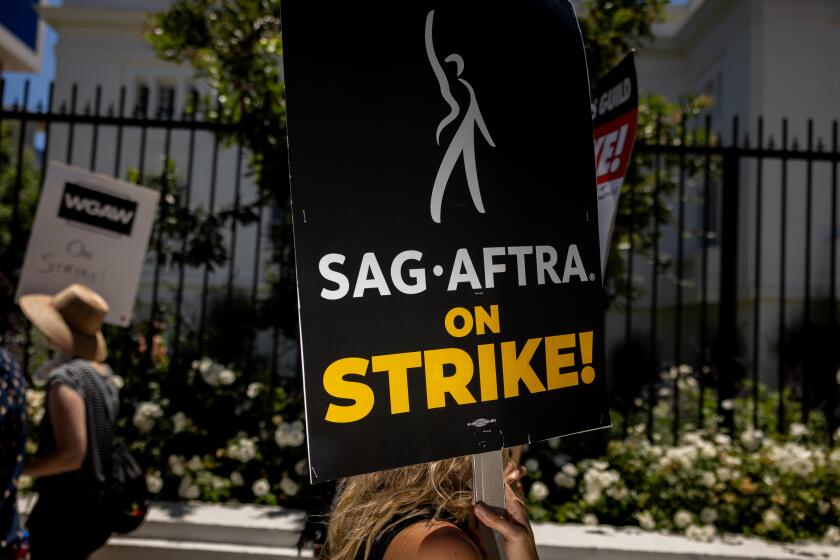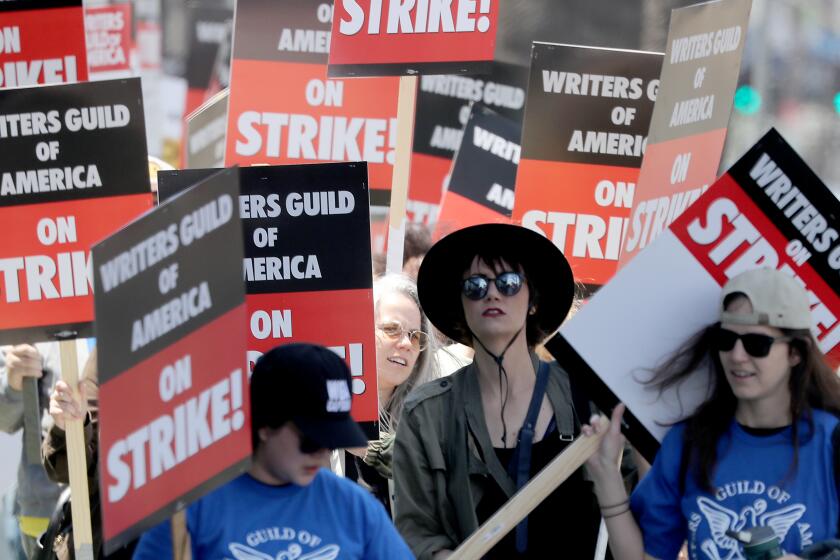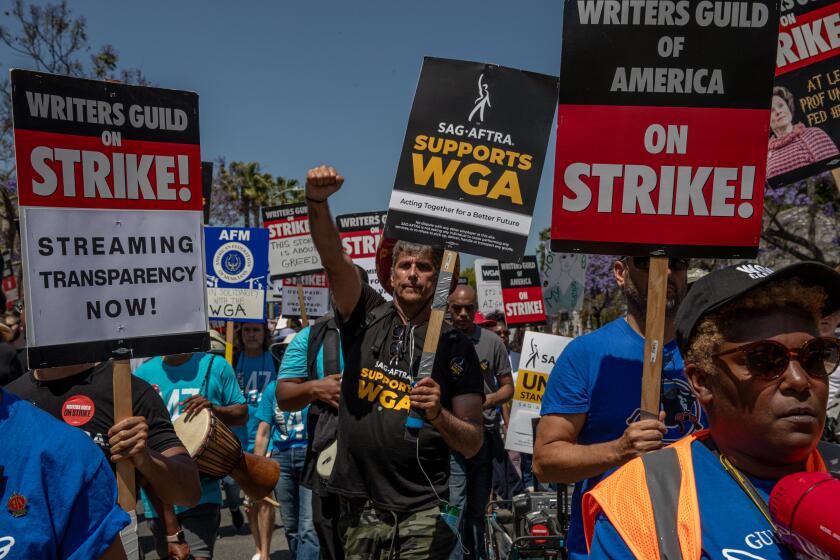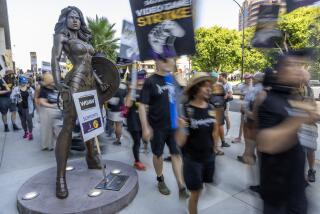Actors said they were making progress in contract talks, then they weren’t. What happened?
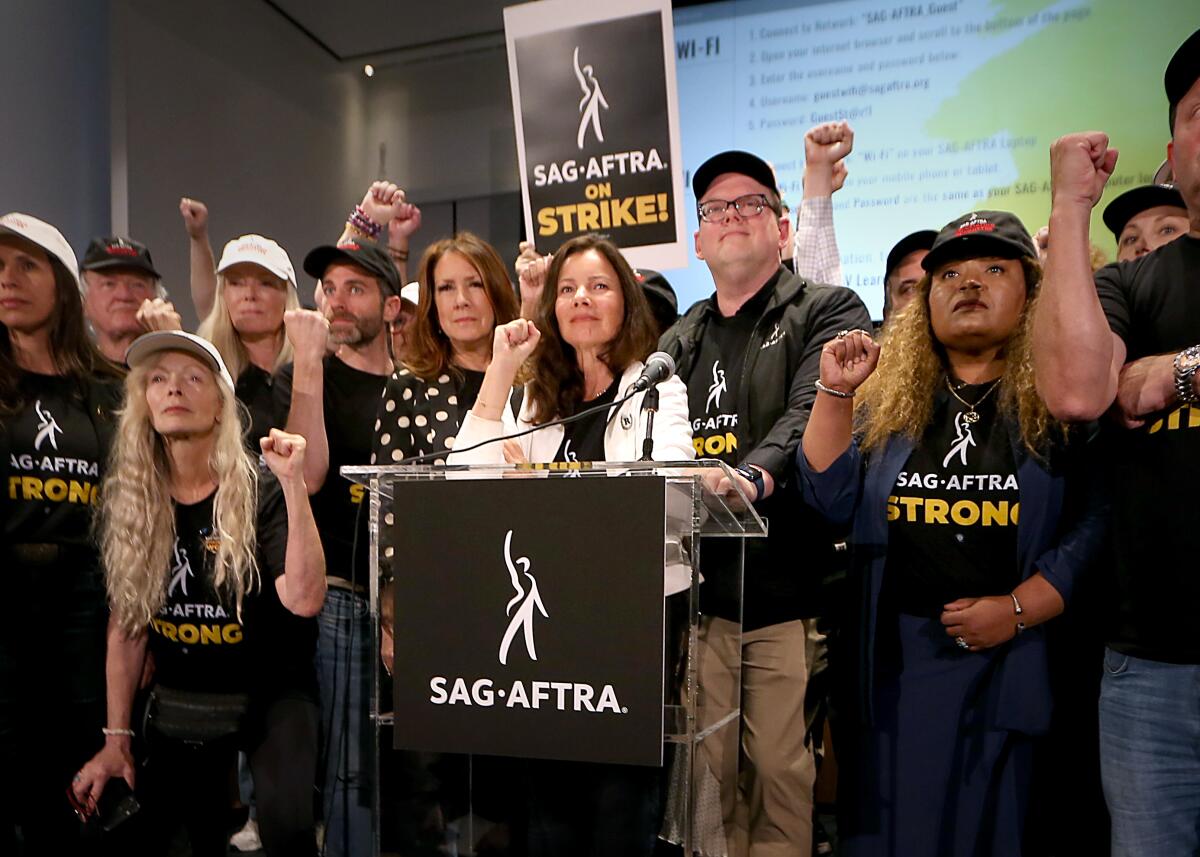
- Share via
Nearly three weeks ago, it looked as if SAG-AFTRA was headed toward a landmark deal with the major Hollywood studios.
In a video to the union’s 160,000 members, SAG-AFTRA President Fran Drescher said negotiations with the Alliance of Motion Picture and Television Producers had been “extremely productive.”
“We’re standing strong, and we are going to achieve a seminal deal,” Drescher vowed.
But in the end, talks broke down.
On Thursday, SAG-AFTRA board members voted unanimously to call a strike against the studios — the first such walkout in 43 years. Actors on Friday morning will join striking writers who have swarmed picket lines outside major film and TV studios around Los Angeles and New York since early May.
So what went wrong? Interviews with people close to the negotiations cited a series of roadblocks that made a deal next to impossible to achieve during just 35 days of bargaining. Major contractual sticking points — including over basic pay, streaming residuals and the threat of artificial intelligence — persisted throughout the talks, preventing a breakthrough to reach a historic accord.
SAG-AFTRA has approved a deal from the studios to end its historic strike. The actors were on strike for more than 100 days.
Talks stretched almost until Wednesday’s midnight deadline. Union leaders made last-ditch calls to studio heads — including Netflix Chief Executive Ted Sarandos, Warner Bros. Discovery CEO David Zaslav and Walt Disney Co.’s co-entertainment chiefs Dana Walden and Alan Bergman — to plead with them to break the logjam, said sources close to the negotiations who were not authorized to comment.
By early Thursday morning, Disney chief Bob Iger appeared on business news channel CNBC and accused actors and writers of “not being realistic” in their demands.
He articulated a widely held view of studio heads: Writers and actors have refused to recognize harsh economic realities facing entertainment companies amid profound shifts in consumer behavior.
The AMPTP, which negotiates on behalf of the companies, said Thursday that it “presented a deal that offered historic pay and residual increases” and other protections, including on the use of artificial intelligence. “The union has regrettably chosen a path that will lead to financial hardship for countless thousands of people who depend on the industry.”
Members of SAG-AFTRA and the Writers Guild of America say it’s the AMPTP media companies, including Disney, Netflix, Warner Bros. Discovery, Paramount Global, Amazon Studios and Sony Pictures Entertainment, that fail to grasp the realities facing Hollywood’s working class — which have deteriorated in the streaming era.
That was the message Drescher and other union leaders delivered at the union’s Wilshire Boulevard headquarters Thursday when they announced the decision to strike.
“If we don’t stand tall right now, we are all going to be in trouble,” Drescher said. “We are all going to be in jeopardy of being replaced by machines and big business who cares more about Wall Street than you and your family. At some point, you’ve got to say ‘no.’ ”
With Friday’s walkout, scripted film and television production will grind to a halt.
Analysts predict the economic damage reverberating throughout Los Angeles due to simultaneous strikes by writers and actors will be enormous and could forever change the entertainment industry. Some studio executives are predicting the strikes could stretch into the fall.
Such a bleak scenario appeared unlikely only a few weeks ago after Drescher stood alongside SAG-AFTRA’s chief negotiator, National Executive Director Duncan Crabtree-Ireland, at the Sherman Oaks headquarters of the AMPTP to deliver her video message to members.
On that Saturday night, Drescher appeared to be painting an overly rosy picture of the negotiations because, at that point, there hadn’t been any substantial movement by either side on pivotal deal points, according to people close to the negotiations.
The 2023 writers’ strike is over after the Writers Guild of America and the Alliance of Motion Picture and Television Producers reached a deal.
In fact, the day before the video was recorded, talks had grown contentious when SAG-AFTRA pressed what it felt was an important demand. The union wanted streaming companies, including Netflix, Disney and Amazon, to share with the performers the revenue generated through subscriptions, the knowledgeable people said.
SAG-AFTRA had asked that 2% of the streaming revenue be distributed to performers who appeared in their most successful movies and shows. Because streaming companies have refused to provide precise viewership data with producers and other creatives, SAG-AFTRA suggested using data from a third party, such as Parrot Analytics, to measure the popularity of streaming programs.
That always was a non-starter for streaming companies, which noted Parrot Analytics largely measures social media conversations that gauge interest in a program — not actual viewership. And they refused to budge on giving show creators the actual audience numbers.
On Thursday, Drescher was asked about her sanguine tone during the June 24 video.
She said she went into negotiations thinking a deal was within reach, but “they weren’t really ready to get to the core issues,” she said.
The video triggered an avalanche within SAG-AFTRA. Hundreds of A-listers — including Meryl Streep, Amy Schumer, Jennifer Lawrence and John Leguizamo — wrote an open letter to the union’s leadership, applying added pressure. Their message: Do not stop short of anything less than a “transformative” deal.
“We are concerned by the idea that SAG-AFTRA members may be ready to make sacrifices that leadership is not,” the letter said. “This is an unprecedented inflection point in our industry, and what might be considered a good deal in any other years is simply not enough.”
Hollywood is once again in the midst of a historic labor battle in which studios are facing a possible strike on two fronts in a protracted fight over new forms of distribution.
SAG-AFTRA leaders extended negotiations beyond the original June 30 deadline to July 12. Negotiators on both sides took just one day off from the bargaining — July 4.
Studio insiders groused about the sheer volume of SAG-AFTRA proposals that needed negotiating. Union leaders put dozens of proposals on the table, according to knowledgeable people. Some complained that SAG-AFTRA filled the negotiation room with more than 30 members of its negotiation team — causing delays in meetings and decision-making.
Drescher and Crabtree-Ireland disputed the claim that they did not prioritize the demands, saying studio responses were tone-deaf and “insulting.”
Many of the union’s concerns revolved around how profits are shared in Hollywood and union members’ ability to sustain a living in the profession. The union has argued that outdated contract terms, coupled with shorter seasons and longer hiatuses between seasons make it increasingly hard for many actors to maintain a middle-class lifestyle.
“The entire business model has been changed by streaming, digital, AI,” Drescher said. “You cannot keep being dwindled and marginalized, and disrespected and dishonored.”
At the negotiating table, there was little movement, particularly over key issues including wages. SAG-AFTRA had initially demanded basic rate increases of 15% in the first year of the contract — triple the amount that Directors Guild of America members accepted in an agreement reached last month with the studios. SAG-AFTRA eventually lowered the raise to 12%. On Wednesday, the guild suggested 11% in the first year.
SAG-AFTRA complained that 5% didn’t keep up with inflation. The studios were not moved.
“I cannot believe it, quite frankly, how far apart we are on so many things,” Drescher said.
Much of the disagreement centered on residuals, the fees paid out when shows or movies are re-aired after their initial broadcast. With international distribution becoming a dominant form of revenue, SAG-AFTRA hoped to bolster the residual formula and have residuals reflect the success of shows.
Another major sticking point was the use of artificial intelligence, which “has already proven to be a real and immediate threat to the work of our members and can mimic members’ voices, likenesses and performances,” SAG-AFTRA has said.
AMPTP offered what it called a groundbreaking proposal that it said “protects performers’ digital likenesses, including a requirement for performer’s consent for the creation and use of digital replicas or for digital alterations of a performance.”
But SAG-AFTRA negotiators noted that companies could scan the initial performance of a background actor and then reuse the image without their consent indefinitely.
“They would ‘own’ you for the rest of eternity,” said one person close to the SAG-AFTRA negotiating team who was not authorized to comment.
AMPTP members said the claim was inaccurate. “They would have control and approval rights over their digital replicas,” according to a studio insider.
Earlier this week, studios scrambled to call in a federal mediator to help move talks along. But some — even those who are close to the AMPTP — questioned why the studios hadn’t opted for a mediator sooner.
“We get to the last minute and then all of a sudden they want mediation,” said a source in the SAG-AFTRA camp.
On Wednesday night, after Drescher and Crabtree-Ireland left empty-handed from their calls with leading executives at Netflix, Disney and Warner Bros. Discovery, they returned to the bargaining table with the AMPTP negotiators.
With just minutes remaining in the contract, the actors told the companies they were prepared to negotiate further, Crabtree-Ireland said.
Crabtree-Ireland said the AMPTP responded that the companies weren’t willing to go forward unless the actors would “act in a civilized manner,” which riled Crabtree-Ireland, who said Thursday that calling a strike is a core legal right of organized labor.
An AMPTP representative disputed the characterization.
More to Read
Inside the business of entertainment
The Wide Shot brings you news, analysis and insights on everything from streaming wars to production — and what it all means for the future.
You may occasionally receive promotional content from the Los Angeles Times.
